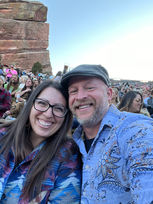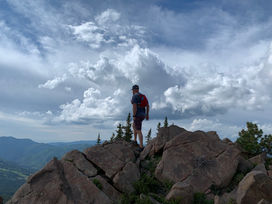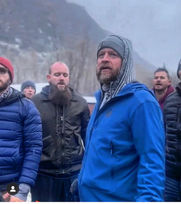Skillful Navigation (or the lack thereof)
- Tony Pizza

- Oct 20, 2023
- 9 min read
The other day, a client asked such a good question: “Do you ever get anything from these sessions with me?” My genuine response, “Dude. You have no idea.” The reoccurring theme this week with many of my clients has been Skillful Navigation and it came up from a conversation I had with my Canadian friend Peter while visiting High River last weekend. We are in constant navigation of life’s problems, successes, challenges, and choices. So how do we do this skillfully?

I’ve had to self coach myself a few times in the past week. Anyone reading this for juicy vulnerability should get the popcorn and comfy blanket ready.
I’ve noticed myself get triggered a few times within my romantic partnership. On the surface, I imagine myself appearing completely blocked off, unwilling to engage, resentful, and perhaps even childish in response to some of the events in her and my daily life. Any attempts to engage with me in those moments are usually left with short answers and a lack of eye contact. I usually become so "busy" that nobody would dare get in my way or really ask if everything is OK. I even find myself judging myself with how petty the instigating moment seems after, and yet the raw emotion is real as it almost overwhelms me. It’s my equivalent of getting thrown into water far from shore and confronting my fear of drowning.
My most recent incident is honestly one that I’m still experiencing the emotions of as I write this. In attempt to keep the emotions raw and present, I decided it might be a good idea to write about it while things are their freshest.
My partner and I are getting ready to go on a camping trip with my friend Josh, who is a rock hound. He’s offered to take us into the wilderness, find a beautiful rock that we can fashion into wedding rings. Last night, I ran to the storage unit to gather up all of our camping stuff and I remembered my partner mentioning how she wanted ice because that’s how she likes to enjoy her water. So I went to two different stores to find pebble ice. I come home confident and eager to show her what I found for her. Upon entering the house, I saw that her and her daughter had started a scary movie and all of the sudden the emotions hit me like a truck. This all appears to me very dramatic the next day, but in the moment, she might as well been making out with another guy on the couch. I didn’t make a big scene, but it was obvious I was hurt. I said in an unfriendly, but not angry voice, “You guys are jerks.” The irony is that by me saying that, I was being the most “jerk-y.”
This is not an example of skillful navigation. I knew it almost immediately.
Before I finish that story, let’s dissect some of the foundations of skillful navigation.

Awareness. This is the beginning and essential part of the entire process. Unless an appropriate response is already engrained as a habit, Skillful navigation is impossible without awareness.
Awareness of one's thoughts, actions, and emotions is critical, but a deeper sense of awareness is even more important. Because all choices are consciously or unconsciously predicated off of our value system, awareness of what makes up our value system is essential and takes a lot of practice and work to get to the roots.
There also must be a gap of discernment present. This gap is the distance between an occurrence and the reaction to that occurrence. Impulse has almost no gap of discernment and is driven by habit. It’s the most unconscious response to an occurrence. Mindfulness and meditation help expand this gap. The idea is that there is an array of different ways to respond to a situation. Most, if not all, of the ways we choose to respond are built on a series of habits. Some choices are good for the short term, but terrible for the long term. Other choices are good for the long term, but challenging in the short term. Other choices fall in the middle. The concept of the gap of discernment is to lengthen enough time between occurrence and response that we have time to consider and make the best long-term choice. This applies to everything from eating a snack, honoring ourselves in a yoga pose, or responding to a partner when something happens that is uncomfortable.
This is how things did and didn't go very skillfully in my uncomfortable moment.
I immediately went to fill up my partner’s water bottle and give her what I meant to give her. I started to do the dishes and warm up water for tea. All three of these things are things I consistently would do or have done in the everyday course of our lives. If I’m being honest, the action was the same, but the energy was not. The actions were tainted with some minor resentment—A I’ll show you what it means to be thoughtful attitude. I also have to have some grace that I do these things even when I’m not feeling hurt. So I was also responding out of habit and in line with my values, too. It’s not like I was being completely inauthentic, but there was some covert contract* involved. Humans are complicated.
I decided to take myself upstairs and really sit with the emotions that I was feeling. I knew immediately I’d felt the same emotion flair up several times over the past few weeks. I immediately felt guilt and shame. Thoughts of, “I am too much, I’m too emotional. My partner is going to get fed up with me constantly feeling this way and putting her in an emotional rollercoaster.” came to mind. I also immediately remembered two things: It’s important for me to have a partner that stays with me during my storms; and I was responding in part to a past wound of feeling dispensable in the relationship (my feelings, not hers). These are valid feelings and I can feel shame about them, or try to honor where they were coming from.

I decided to do some hapé* and drop into some deeper meditation to explore what was going on in myself and where all of this volcano of emotion was coming from in me, and not because of someone else.
Going upstairs and taking some time for myself and leaning into my discomfort is where I believe things started to become much more skillful.
I immediately held two thoughts: My feelings are valid and I also felt sorry for calling my partner and her daughter “jerks.” I immediately took accountability and apologized over text. My partner said that she didn’t mean to be exclusive or thoughtless. I told her that I needed to take accountability for the reason a wound was getting pressed upon.
With that portion of my experience taken care of, I went deep inside and tried to collect moments in my life where I feel like that root started. It wasn’t hard to find a few key experiences. I remembered the pain of losing 20+ friends in junior high school in one fell swoop after an argument and subsequent fight I had with our friend group’s ring leader. Losing that many close friends in one afternoon still had some lingering debris. I remember feeling excluded in the natural course of parents divorcing. There’s exclusion that’s naturally felt not having both parents in my day-to-day life, and also in not being in theirs. There was some even deeper feelings of exclusion knowing that my siblings and I, alongside my dad, were the “non-practicing Mormons” on his side of the family. A feeling of not being good enough was felt over and over there. Even going to a very wealthy public school and being the poor kid who had to live in an apartment came up for me in my exploration. The purpose to all of this pondering, by the way, was not to victimize myself. It’s to acknowledge that this river of emotion started somewhere. The goal is to get down to that place, the source of the leaking dam, so to speak. I noticed a common theme of my life: I’ve never lived in one place for longer than a few years. I’ve never had a romantic relationship of any sort last more than a few years. I’m constantly in fear of, and constantly recreating situations where I don’t feel at home, and I’ve done my damnedest to at least create that within myself, but I also get very protective of myself when I don’t feel like I’m being welcomed in and considered by others.
When I made that connection, so much of the tension released. Like the emotional wound got some significant ointment on it. I felt my defenses go down and my mind stopped being so consumed with the story. With no story, my emotions started to regulate again. In full disclosure and honesty, this doesn’t mean that I think I all of the sudden began acting perfectly skillful. To put this metaphorically, I wasn’t being bludgeoned by the swinging pendulum of life. I was now riding on top of it like a mouse on the pendulum of a grandfather clock, but it was more like riding a bull than a bicycle.
Later that night, I did yoga with my partner and resentment was still lingering. I went to bed with resentment. With resentment still there, I was awoken by the too-drunk, barfing neighbor, the loudly bathing cat, and the restless eight-year-old in succession. When it was finally time to wake up, my partner wasn’t in bed, so I showered, got dressed, and went to the climbing gym. I was still unskillful in leaving without saying goodbye, something that is so hypocritical because I would (and recently did) get very upset at the very same thing.
The key for me in watching myself try to course correct on skillful interactions is still playing in that space of awareness and the gap of discernment. I’m aware that I still feel some resentment. I want to open up, and I haven’t given myself permission to do that yet. Telling my partner what’s coming up and how I’m feeling is helping, and then I spill into resentment again by not having her reach out to me and try to understand how I’m feeling. It leaves me feeling guilty. Am I putting on a performance so she can see that I’m angry and ask what’s wrong, or am I OK to feel this way because I still feel the angry emotions going through me. Or is it both?
Then I realize that holding all of this at once is the real beginning of my skillful navigation through my more challenging emotions. I’m doing my best to take accountability for what I’m bringing to the table. I’m doing my best to express what I’m going through because I know I’m impacting another person through this ride on the pendulum. I know I have a wound that I’ve just discovered and have some processing to do there. I also know that I don’t want my temporary emotions to create a wound within my relationship that impacts the longterm. “So how do I skillfully navigate all of this?” I ask myself. Here’s where my yoga practice is coming in handy. For almost two months now, my partner and I have done yoga almost every night. Sometimes the poses feel challenging, sometimes they feel easier. They never, however, feel like I’m demonstrating any real flexibility on a human standard. If you watched me do yoga, you’d think I just started yesterday. Yet in Tony standards, I’m much more flexible than I was two months ago. And when I really think about it, yoga isn’t really so much for the body as it is for the mental practice of awareness. Yoga was not created to get fit. Yoga was created as a physical practice of mindfulness.
So like a yoga pose that pushes me into discomfort, I have learned something. The longer I stay at my edge and breathe, the more my flexibility is impacted in the long run. Right now, I’m in a challenging yoga pose of emotion within the practice of life. My body feels on the edge of having a Charlie horse. I know I could back out, and I know that there’s tons of benefit to staying here, at my edge, and seeing what’s here. Maybe it’s like getting thrown out into the water? Maybe my body knows how to float better than I’m trusting that it does? So maybe I can turn over on my back and just breath for a moment and regain my bearings and see what feels scary and what feels like I can breath through?
Most poignantly, it feels important to be honest with my partner, without blaming. To take accountability about why the intensity is there, and also be honest about what happened to bump up against a still-tender-and-hopefully-mending place inside. Honesty, authenticity, compassion, and vulnerability are all happening in a soup-type experience. Writing this out and sharing it with my partner not only has helped me sort through it, but brings some relief in sharing it beyond.

So when my client asks me, “Do you gain anything from our sessions?” I can say, “Fuck yeah, man. I’m a human being with emotions and messiness, too. I have to practice skillful navigation just like everyone else. When I do it imperfectly, it’s always an invitation to see if I can understand it better so that the next time, I’m able to stay in that pose a little longer, do it a little more skillfully. The truth of it is, it’s not really a skill if we’re born with it. It’s more of a characteristic. Skill is something that takes time, it’s cultivated, and a product of trial and error so that we can do something more smoothly and with the expertise of someone with those 10,000 hours under their belt.
Notes:
*Dr. Robert Glover goes into great length about covert contracts in No More Mr. Nice Guy. The key is that we do stuff with the unspoken expectation of getting something in return. This is one of the fastest ways to feel resentment and set an interaction up for failure.
•Hapé (sometimes spelled rapé) is a tobacco snuff that comes from indigenous places all over Central and South America. It's used for grounding, meditation, energy clearing, and more. Consult a skilled practitioner in your area, or reach out to me personally for more information.



















This Canadian sounds like a solid dude... As I've worked with my own clients, I've never been asked that question outright, but I ALWAYS get something personally beneficial from the engagement. Some new insight about how I navigate space with them that I wouldn't have noticed otherwise. The combination of these two specific people in that time and place is unique in the universe and it has significant lessons to learn, as I long as I am open to receiving them. One specific benefit of these experiences is more awareness of where I am subject to transference or counter-transference. What about a client's experience surfaces something in me that I need to work on in my own therapy or education o…
Love this post! I think often times I've seen coaches the way I saw teachers when I was young. They only existed there in that space and as soon as I wasn't there any more they ceased to exist. 😅 The reality is, in my opinion, the best coaches coach from experience and sometimes that experience is especially messy and imperfect. You're a damn good example of a commitment to constant evolution and increased awareness. Thanks, brother! -Joe